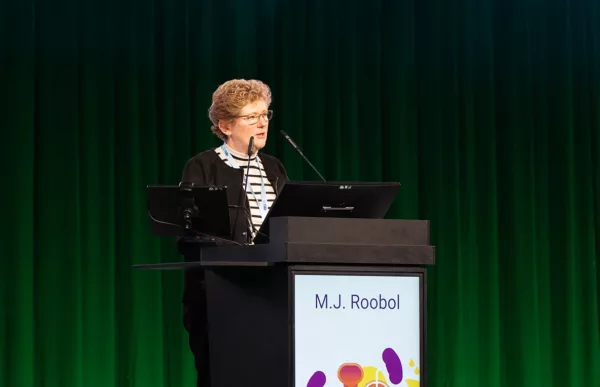No compromises: GU-cancer care can be effective, equitable, accessible, and sustainable by 2050
This year’s 17th European Multidisciplinary Congress on Urological Cancers (EMUC25) will tackle one of the most pressing questions in oncology and urology today: how can GU cancer care stay effective, fair, and accessible, without compromising economic or environmental sustainability?
Leading voices such as radiation oncologist and one of the session chairs, Prof. Thomas Zilli (CH), together with some of the presenters epidemiologist Prof. Monique Roobol (NL), medical oncologist Prof. Yüksel Ürün (TR), and urologist Prof. Veeru Kasivisvanathan (GB) will provide crucial insights during Plenary Session 1: Innovating for a Sustainable Future in Genito-Urinary Cancer Care: The Road to 2050.
Why the focus on sustainability?
“This session was inspired by a growing awareness that sustainability in healthcare must extend beyond environmental concerns to include economic viability, resource optimisation, and equitable patient access—especially in a field as complex and evolving as GU cancer care where technology and new systemic therapies are growing exponentially,” said Prof. Zilli.
From the perspective of radiation oncology, he noted both the progress and the tension: “We’ve seen remarkable advances in the last decades in imaging, planning, and delivery, but these innovations often come with increased costs, energy demands, and disparities in access. As we look toward 2050, how can radiation oncology continue to evolve in a way that is environmentally responsible, economically feasible, and equitable across diverse patient populations?”
Provoking a mindset shift
Prof. Zilli emphasised that Plenary Session 1 is designed to provide both inspiration and practical tools. “We want to provoke a mindset shift where sustainability can become an integrating part and principle of clinical decision-making, policy planning, and innovation. In addition, we also want delegates to leave with actionable insights such as sustainable technology adoption, frameworks for reducing the environmental footprint of care, or collaborative strategies to address disparities in access.”
The examples he provided included hypofractionation in radiotherapy, artificial intelligence (AI)-driven planning, and cloud-based systems to improve access in underserved regions.
New frontiers
Prof. Zilli highlighted one of the most provocative themes of the session: the intersection of precision medicine and sustainability to provide personalised treatment by means of imaging, biomarkers, AI-driven tools; prevent overtreatment; and reduce waste and costs.
The session will also address ethical and global questions, from equitable access to cutting-edge treatments to the environmental implications of diagnostic and therapeutic pathways.
A sneak peek and dispelling myths
In her lecture, Prostate cancer screening at its best, Prof. Roobol will discuss how prostate cancer screening has evolved from an era of evidence-gathering through randomised trials to one focused on applying these results in healthcare, as Europe prepares to address a disease affecting so many men.
Prof. Roobol also revealed a sustainability myth in her field: “A common myth is that organised prostate cancer screening does not reduce unnecessary healthcare costs, when in reality, it is the only way to sustainably reduce the burden of this disease.”
“In genitourinary cancers, sustainability means integrating evidence-based innovations with rational use of resources,” said Prof. Ürün. In his lecture, Sustainable treatments: Medical oncology, he will provide strategies to optimise treatment duration; select therapies using validated biomarkers; and design sequencing that preserves future options.
He also addressed misconceptions: “Many assume that sustainability conflicts with optimal cancer care, but the opposite is often true. Avoiding low-value interventions, limiting overtreatment, and tailoring intensity to disease biology can improve outcomes and reduce toxicity. From my perspective, sustainable oncology is not a compromise, it is the foundation of long-term quality care.”
“My lecture, Sustainable diagnosis and staging, will discuss delivering the right investigations to the right patient at the right time, whilst minimising harm, cost, and environmental impact. With an ageing population, a surge anticipated in prostate cancer cases, and the introduction of novel imaging techniques, this is an increasingly important topic,” stated Prof. Kasivisvanathan.
When asked about sustainability myths in urology, he said, “A common misconception is that sustainability is not the urologist’s direct problem. However, I believe that urologists need to play an active role in ensuring sustainable care, as we are the ones making key decisions about who to biopsy, which imaging to order, and how to stage patients, which in turn influence the sustainability of the services that we provide.”
Not less, but smarter
Whether in screening, diagnosis, treatment, or long-term planning, the experts highlighted how sustainable practices can reduce waste, lower costs, expand access, and ultimately improve outcomes.
As Prof. Zilli put it, “The goal is to equip delegates not only to think differently but to act decisively in shaping a more sustainable future for GU cancer care.”
EMUC25 awaits you
The congress scientific programme blends the latest developments, actionable insights, and hands-on activities—all designed to make a real impact on your clinical practice and patient care. Join us at EMUC25 and register here.
Have insights, research, or innovations to share as late-breaking abstracts? Be heard, be seen, make an impact—submit your abstract before 1 October 2025 and contribute to the dialogue on optimal GU cancer care.
